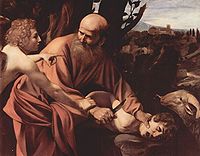God gives, God takes away (almost)
 The hero of the Torah readings on both days of Rosh HaShanah is Abraham and Sarah’s son Isaac.
The hero of the Torah readings on both days of Rosh HaShanah is Abraham and Sarah’s son Isaac.
On the first day we read the story of his birth to elderly parents who had given up hope of having a child. On the second day Isaac is almost lost; God tells Abraham to make Isaac an offering and only the intervention of an angel from On High saves the lad.
Michelangelo made two attempts at depicting the event. In one artistic representation we see the theatricality of a father boldly standing over his son with the sacrificial knife.
In the other there is absolute agony on the father’s face as he prepares to see his dreams shattered and his future summarily severed.
It is understandable that Christian sources apply the episode to Jesus – understandable but wrong. For the Binding of Isaac is no crucifixion and Isaac does not suffer unbelievable anguish on the way to the altar, nor does he say, “My God, my God, why have You forsaken me?”.
As Ignaz Maybaum points out in his monograph, “The Sacrifice of Isaac” (1959), the whole atmosphere of the story is calm and trusting. Both Abraham and Isaac walk humbly before God. Neither is trapped. Each is “free to return home. No compelling logic drives him to go on”.
This is not a day of inescapable dark clouds, a tragedy working inexorably towards its horrific climax. In the end there is relief. The future is saved.
If God wishes there to be no future, His will is accepted calmly and trustingly. If He does wish there to be a future, that too is accepted with calm and trust.



